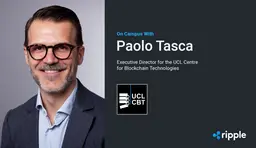A now famous Paul Steiner New Yorker cartoon made a prescient point about online trust in 1993 when it portrayed two dogs in front of a computer with the caption, “On the Internet, nobody knows you’re a dog.” Humorous, true and frightening.
Today, this lack of transparency lies at the root of scams involving Nigerian princes and clickbait news stories. Dr. Paolo Tasca, Executive Director of the Center for Blockchain Technologies at the University College of London (UCL CBT), is committed to solving for this lack of trust online and is using Ripple’s University Blockchain Research Initiative (UBRI) to develop a trust-based methodology for capturing fair price in the Internet of Value.
Dr. Tasca uses today’s fake news phenomenon to illustrate how a lack of trust or transparency in the Internet of Information can impact our daily lives. The prevalence of these stories makes it difficult to believe many things we hear or read, and forces people to go to extreme lengths to verify news or risk taking action based on unreliable sources.
For Dr. Tasca, this lack of veracity is unacceptable in the Internet of Value. In this environment, fake information equates to fake value and lost assets. Parties must be able to trust the assigned value of an online or offline asset in order to realize speedy, accurate transactions.
He says this is especially true when assets are transferred multiple times, creating problems in asset value, assessment, asset pricing and credit assessments. Corrupted data or a lack of information will eventually lead to social risk caused by lost value.
Dr. Tasca has been at work developing new tools to make it possible to quickly determine the quality and trustworthiness of the information related to all cryptocurrencies we view online. Now through UBRI, he is engaging a team to apply similar methodologies to create trust indicators for the Internet of Value. At the same time, at UCL CBT more than 50 other researchers and data scientists are using the UBRI program to explore new areas of research to enhance understanding of the Internet of Value and the emerging decentralized platform economy.
Dr. Tasca’s work leverages blockchain to develop metrics or indices that will allow end users to quickly assess the trustworthiness of a value that is being deployed or transacted online. He believes these visible instruments will give rise to an entirely new industry providing unbiased value assessments of assets and transactions.
In addition to providing the funds needed to assemble 10 different research teams, Dr. Tasca says UBRI helped enable the University’s first hackathon conducted on blockchain and in conjunction with Ripple. From this session, he hopes to provide documented use-cases to developers for the new SDK that has been announced as Xpring.
Finally, the UBRI grant has allowed Dr. Tasca to ramp up marketing support for his team’s work and broaden awareness amongst the researchers, entrepreneurs and businesses that can benefit from it. As part of that effort, he plans to share key findings in a report entitled Internet of Value that will be published before the year’s end.
Dr. Tasca will also preview some of these findings at Ripple’s upcoming SWELL event this November in Singapore as part of his planned presentation on trust-based risks for the Internet of Value.
Ultimately, the success of Dr. Tasca’s work could very well force the New Yorker to update its cartoon with a disclaimer noting that it no longer applies to the Internet of Value.
To learn more about UBRI, please visit our UBRI website and look for monthly Insights posts in the On Campus series.









